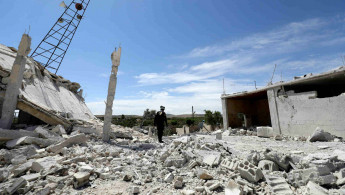UK citizens have '28 days to leave' Syria or risk 10 years in prison
British citizens will face up to 10 years in prison if they travel to northern Syria under a controversial new counter-terrorism law, Home Secretary Sajid Javid will announce on Monday.
The new act allows the UK to ban nationals from travelling to, or remaining in, certain areas.
Javid will tell Britons based in Syria's northwestern Idlib province and the country's north east that they must leave within 28 days, The Times reported.
If they fail to comply, UK citizens will face up to 10 years in prison upon their return home.
The home secretary will tell senior security officials in London on Monday how he plans to use the new Counter-terrorism and Border Security Act which came into force last month.
The law has already faced criticism from rights campaigners who say the home secretary's increased powers will mean a crackdown on the freedoms of expression and the press.
It also grants border guards broader powers for stop-and-search on the grounds of "hostile state activity" and criminalises viewing online content related to terrorism - even if viewed for research or journalistic purposes.
Idlib is one of the last territories outside of Bashar al-Assad's control.
The area is mostly controlled by the extremist group Hayat Tahrir al-Sham (HTS, formerly the Al-Qaeda-affiliated Jabhat al-Nusra).
The estimated three million Syrians gathered there - more than half of them refugees - have been subjected to an escalated aerial bombardment campaign since late April, raising alarm over a possible looming full-on offensive by Damascus to seize the territory.
The Russian army on Sunday announced that regime forces had declared a unilateral ceasefire in Idlib, putting at least a temporary halt to hostilities in the province.
Hundreds of Britons are thought to have travelled to Idlib and Syria's north east, which is majority controlled by Kurdish forces.
While some of those UK citizens ostensibly traveled to Syria as humanitarian workers, others have fought for extremist groups, such as the Islamic State group, or the Kurdish YPG forces.
An estimated 900 UK nationals are thought to have travelled to Syria to join IS, around 40 percent of whom are presumed to still be in the region, Javid told parliament in February.
Among a number of former British nationals stripped of their citizenship after traveling to Syria - many of them suspected of joining IS - was aid worker Tauqir Sharif.
Sharif, currently stranded in Idlib with his wife and children, had his citizenship revoked in 2017 after the UK government accused him of links to Al-Qaeda.
Javid is also expected to emphasise the UK's need for international co-operation in fighting terrorism.
"More than any other country on Earth, the UK has a coherent, connected approach to intelligence and security and when threats appear, the world still turns to the UK for leadership, support, and action,” he will say.
Follow us on Twitter: @The_NewArab





 Follow the Middle East's top stories in English at The New Arab on Google News
Follow the Middle East's top stories in English at The New Arab on Google News


